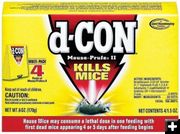What happened to d-CON?
by Pinedale Online!
December 26, 2015
If youíve tried to find d-CON mouse and rat poison lately and canít find any in the stores, the reason is because the U.S. Environmental Protection Agency (EPA) took action in 2013 to ban 12 rodent poison products made by the British company Reckitt Benckiser saying they donít met current EPA safety standards and "pose unreasonable risks to children, pets, and wildlife." All 12 of the products were being sold without a protective bait station. The EPA requires bait stations for consumer products to protect children and pets from contact with bait pellets.
The EPA had issued a Notice of Intent to Cancel these products in February 2013. The manufacturer exercised its right to contest the cancellation through an administrative hearing process. After a long battle, the company and EPA reached an agreement in June, 2014 where the company voluntarily agreed to stop manufacturing the 12 products in question by the end of 2014. Reckitt began phase out production of the 12 d-CON rat and mouse poison products in June 2014. Production of these products stopped on December 31, 2014. Distribution to retailers ended March 31, 2015. Retailers have been permitted keep the products on the shelves until stocks are depleted. The EPA says it will continue to be legal for consumers to use the 12 d-CON mouse and rat poison products until depleted, provided they follow all label directions and precautions.
Here is a list of the 12 d-CON rodent poison products affected by EPA phase-out:
d-CON Concentrate Kills Rats & Mice
d-CON Ready Mixed Kills Rats & Mice
d-CON Mouse Prufe Kills Mice
d-CON Pellets Kills Rats & Mice
d-CON Mouse-Prufe II
d-CON Pellets Generation II
d-CON Bait Pellets II
d-CON Ready Mixed Generation II
d-CON Mouse-Prufe III
d-CON Bait Pellets III
d-CON II Ready Mix Baitbits III
d-CON Bait Packs III
Consumers who prefer not to continue to use any remaining product in their possession and wish to dispose of it instead should contact their state or local waste disposal program or service for information on proper disposal in their community. The EPA has determined these pesticides are harmful to wildlife, so consumers who have opened containers should not discard them outdoors or dispose of them in sinks or toilets. Consumers can contact their local government for recommendations on how to dispose of unwanted or unused pesticide products.
|
